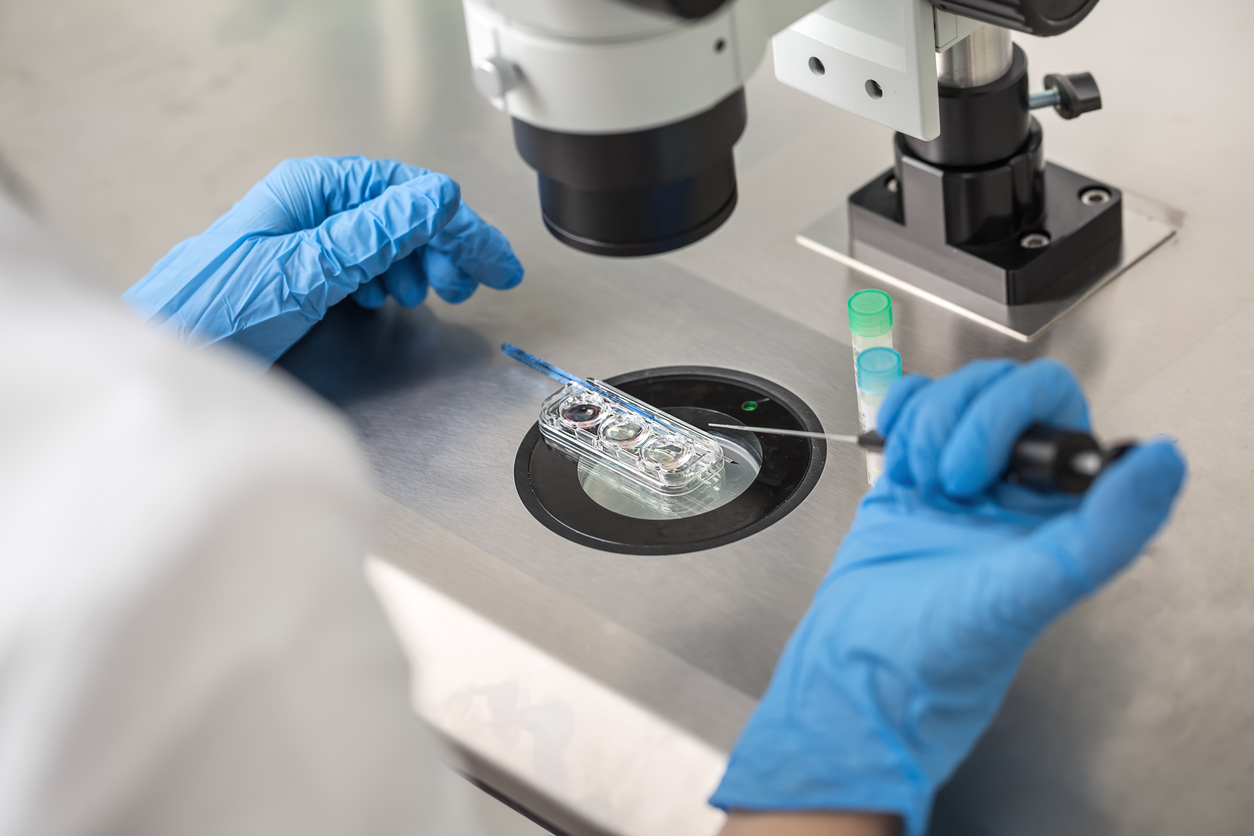How Chicago IVF Provides an Elevated Advanced Laboratory

In the past year, the Chicago IVF laboratory has undergone a number of important, state-of-the-art advancements designed to further elevate the already high level of quality control that our patients have come to expect. Josh Pecenica, a Chicago IVF embryologist, helps explain these changes below, noting how they work to improve overall patient satisfaction at our clinic.
The Chicago IVF laboratory advancements
Equipment-wise, we have improved our air filtration system by adding additional units of Coda Air filtering towers. Air quality is one of the simplest ways to improve overall lab quality, because air eventually diffuses into the culture media that the eggs, sperm, and embryos sit in. Any high-quality lab wants to keep possible air pollutants in the lab as low as possible, as doing so improves embryo development.
Our equipment, meaning our microscopes and the “microtools” we use to observe and handle eggs and embryos, has been serviced and calibrated by an outside professional life science company to ensure they are working in proper condition. In addition, we have invested a great deal in getting more sensitive equipment for quality-control testing. More precise measuring of temperatures, pH, and gas flow are absolutely essential, because it’s these main areas that directly affect embryo quality.
Lastly, Chicago IVF has partnered with MedTech for Solutions, a company that updates lab protocols and implements superb quality-control techniques. Since MedTech became a partner in October 2017, the lab has continually seen higher rates of embryos making it to the blastocyst stage of development (the furthest stage of development that an embryo can be sustained in the IVF lab to date); more freezes of suitable-quality embryos (backup for patients who have failed fresh embryo transfers); and most importantly, higher rates of ongoing clinical pregnancies.
Laboratory advancements as a core patient benefit
It’s the small, inconspicuous differences that really separate first-tier labs from the rest. Since the implementation of these new quality control techniques and updated standard operating procedures (SOPs) from MedTech, again, we have witnessed more embryos making it to the blastocyst stage of development, a better quality of blastocysts produced, more embryos being frozen per patient, and higher rates of ongoing clinical pregnancies.
From a numbers perspective, the average patient </= 35 years old has a 50-55% pregnancy rate for fresh embryo transfers, and a 55-63% pregnancy rate for frozen embryo transfers. Women who are 36-39 years old have a 30-40% pregnancy rate for fresh embryo transfers, and a 40-50% pregnancy rate for frozen embryo transfers.
For women >39 years old, we have a 15% pregnancy rate for fresh embryo transfers, and a 25% pregnancy rate for frozen embryo transfers.
Our highest rates of pregnancies come from what’s called “frozen embryo transfers,” or FETs for short.
Nationwide, clinics have higher rates of pregnancies using frozen/thawed embryos versus fresh embryos, with the thought being that during the month of the IVF cycle, women are still too hormonal from the drugs of the IVF treatment that produce their follicles/eggs.
A typical patient undergoing a fresh embryo transfer to her body has just five days to “calm down” hormonally before an embryo is placed back in the uterus. On her “day 3” or “day 5” of fresh embryo transfer, her uterus may not be even ready to accept the embryo(s).
On the other hand, for FETs, the woman is primarily taking progesterone and her uterus is monitored via ultrasound, so we watch as the uterus gets primed and can more accurately predict the ideal time for the uterus to accept the embryos. When the patient’s body is ready, the lab can thaw the embryos that morning and transfer them. For both freezing and thawing, each process only takes approximately 15 minutes to perform, and for the most part doesn’t impact the embryos negatively.
As you can see, implementing newer SOPs, i.e., switching more patients to freeze-all IVF cycles (and then doing FETs the following month), and also having the quality control that results in having more embryos to freeze from each patient and in those embryos being of better quality, essentially creates a positive feedback loop for success in the lab.
A differentiator for Chicago IVF as a fertility clinic
Our lab is unique because we can combine the statistical successes from many other labs, while still being an independent body that is smaller and more individualized for the patients we serve. In other words, for other labs, having higher volumes of patients and more labs spread across the country means the facilities can develop processes that universally work, while eliminating extraneous factors that may not have any impact at all. However, in that process, they become more like a factory, in that the patient has fewer options (because they have to align perfectly with their crafted SOPs) and can feel more like a number because these places tend to be giant practices.
We partner with MedTech, and while we utilized their data from all their other managed labs to update our SOPs, Chicago IVF is still independent of them and can remain a medium-sized clinic that can give more individualized attention.
For example, at some clinics, patients have to take the same protocol of drugs (even if they might not be as effective as other protocols) and are then forced to have their embryos biopsied (even if there’s no medical history to indicate the use of chromosome screening) and transferred back. There are no fresh transfers or simply frozen/thawed transfers. The patients have to bend to the will of the clinic. Here, if a protocol doesn’t work the first time, we can change things the second time so the patient can have a more effective outcome. At Chicago IVF, the patients have more options, and are not simply funneled through a standardized process.
If you have questions about our IVF laboratory, please contact Chicago IVF today.

